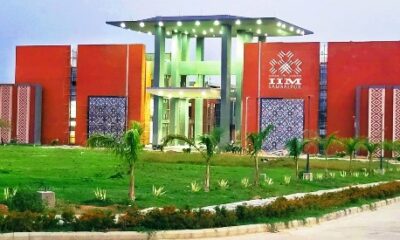Guest Column
Chinese companies go global but what’s in it for India?


Delhi – NCR the most connected office leasing destination for Chinese companies
Over 500,000 sq. ft. of office space leased by Chinese companies in Delhi NCR in 2015 -17
Mumbai, May 7, 2018– In a recent report released by real estate consulting firm, JLL, Delhi – NCR in India has emerged as the favorite office space destination for Chinese global companies. The report says that China’s biggest corporates are growing rapidly and are creating a strong global economic – system that is influencing global markets. Chinese businesses are expanding their global footprint by targeting emerging markets, acquiring overseas firms and making strategic investments in new technologies.
The report ‘China12: China’s Cities Go Global’, evaluates the growth of China’s largest companies that are leading the charge overseas and emerging as some of the world’s most innovative brands. Delhi – NCR emerged as the top destination for office leasing for Chinese companies outside of their territory. The estimated leasing of office by Chinese origin companies has been approximately 516,667 sq.ft from 2015 -17 in Delhi – NCR. Mumbai has seen approximately 85,537 sq. ft. of office space leases by Chinese origin companies in the same period. The ranking, based on leasing volumes across 70 major global markets.
The World’s Most Connected Cities with China: Office Leasing
RANKING
CITY
1
Delhi – NCR
2
Madrid
3
Bangkok
4
Munich
5
Kuala Lumpur
6
Moscow
7
Sydney
8
Istanbul
9
Manila
10
Jakarta
Amongst the global network of cities, Asian markets such as Singapore, Tokyo, Jakarta, Bangkok, Seoul and Delhi are featured prominently. Leading the pack is Singapore as the top destination for mainland firms expanding overseas. Not only is it Asia’s most stable and transparent market and a global financial services hub, Singapore also carries strong links to China and is geographically well-placed to act as a gateway into Southeast Asia.
Two of the world’s most globalized cities – Tokyo and Seoul – come in at close second and fifth places respectively, demonstrating China’s appetite for the world’s leading gateways and financial centres. Jakarta (6th) and Bangkok (10th) are major beneficiaries of Chinese companies’ expansions into Southeast Asia, and Delhi (13th) is a key target as Chinese corporates seek to tap into India’s vast population of over a billion.
Ramesh Nair, CEO and Country Head, JLL India said, “Chinese companies have been making their presence felt in Asia and have set up offices in major markets including India. Even though, leasing is still largely driven by US and EU based companies in India, Chinese companies are fast setting up base to take advantage of the market size and the accelerated growth of the economy. India is a diverse market that provides global corporations both a centre of excellence as well as a promising audience for their products.”
Nair further added, “Several Chinese companies have expanded their footprint in India in recent times including Vivo, OPPO, Alibaba, ZTE, Huawei and Xiaomi. Telecom major – Vivo has taken up space of more than 600,000 sq ft while OPPO has occupied about 100,000 sq ft, both during 2014-17 in NCR. Players like ZTE, Alibaba and Bank of China together have absorbed office space of about 100,000 sq ft in Mumbai during 2015-17. As the two largest economies in Asia, China and India’s economic influence over the rest of countries is expected to be significant.”
Jeremy Kelly, Director Global Research, JLL explains: “Entry into these growth markets allows Chinese companies to tap into Asia’s large, young and rapidly growing consumer populations. We’ve seen some of China’s most prominent firms show major interest in start-ups in India, Indonesia and Singapore as they seek to gain a foothold in these booming economies. E-commerce and consumer electronics firms, in particular, are starting to gain strong market shares in some of these markets.”
Jeremy Kelly further added, “Corporate presence, leasing activity and investment measures clearly indicate a growing interest from Chinese firms in South and Southeast Asia. Delhi, Mumbai, Bangalore, Jakarta, Kuala Lumpur, Bangkok, Manila and Ho Chi Minh City are likely to be key targets for Corporate China. As a result, we may see a realignment in the corporate geography, as attention tilts towards India and Southeast Asia.”
The trajectories of many Asian cities, from megacities to mid-sized hubs, are set to be transformed by Chinese activity in coming years. Alongside increased corporate demand and growing intra-regional capital flows, many emerging South East Asian cities are set to benefit from infrastructure investment related to the ‘Belt and Road Initiative’, which will support employment and boost economic growth, while Chinese technology and innovation will transform the way people live and work in cities.
-



 News3 weeks ago
News3 weeks agoGodrej Properties Sells Rs 3k cr+ Homes of Godrej Zenith, Gurugram, within 3 days
-



 News4 weeks ago
News4 weeks agoRBI’s Status Quo on Key Policy Rates to Help Maintain the Real Estate Growth Momentum, Say Industry Stalwarts
-



 News2 weeks ago
News2 weeks agoNoida’s High-Rise Societies Face Multiple Challenges Despite Rapid Urban Growth
-



 News2 weeks ago
News2 weeks agoOlive Announces Dhruv Kalro as Co-Founder
-



 News3 weeks ago
News3 weeks agoGodrej Properties Sells 5000+ Homes of Rs 9.5 cr in Q4FY24, Bookings up 84% YoY
-



 News3 weeks ago
News3 weeks agoVestian: Domestic Investors Dominate Institutional Investments in Jan-Mar’24
-

 News2 weeks ago
News2 weeks agoIndia to become the fastest-growing silver economy, housing up to 17% of the world’s elderly population by 2050: CBRE Report
-



 News3 weeks ago
News3 weeks agoHRERA Gurugram Rejects Godrej Properties’ Project Extension Application, Account Frozen For Prolonged Non-compliances





























